There is a Great Blue Heron colony near my house in Seattle. In 2001, a group of dedicated volunteers established Heron Habitat Helpers to protect nesting herons and promote habitat restoration. In 2003, they successfully collaborated with the Seattle Audubon Society to have the Great Blue Heron designated as Seattle’s Official Bird. For more than 20 years, volunteers have monitored nest activity during breeding season. According to their website, last year there were 83 active nests and 160 fledglings.
Looking for something to do that had nothing to do with cancer treatment or illness, I volunteered to be a heron monitor this year.
I live in a neighborhood filled with good people and volunteerism is part of the culture, especially if you have kids. Our elementary and high schools rely on parent volunteers. The chaotic middle schools not so much.
We have a thriving food bank to serve our considerable homeless population, as well as less visible families in need. Volunteers donate, pack, deliver, and serve food and raised the funds to move the food bank to a state-of-the-art new building.
The PTA moms I remember from when my kids were young seem to have resurfaced at our local Elks club, a social and charitable group which is one of the fastest growing clubs of its kind in the US, maybe because of the prime waterfront location of the outdoor bar and the inexpensive cocktails.
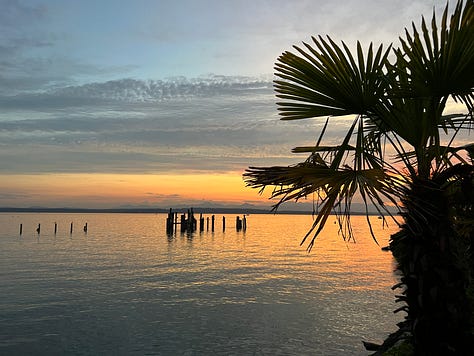
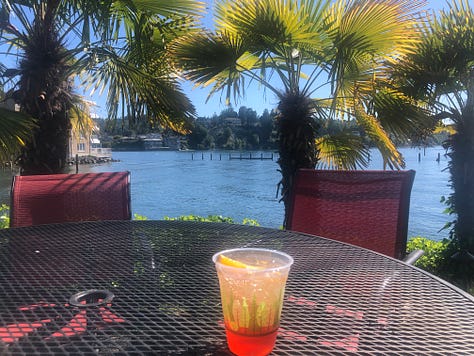
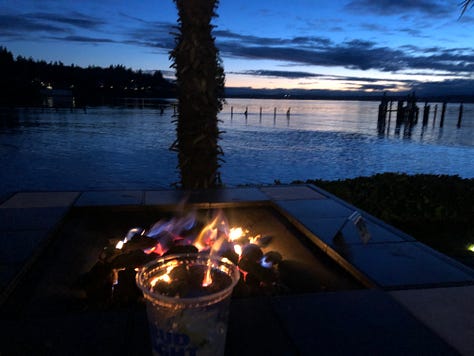
Volunteerism reigns supreme here too. The best volunteer gig I ever had was being a goat handler, holding the leashes of the goats the Elks had hired to munch overgrown weeds on the banks of our not-so-secret Secret Beach, a popular spot for cold-plungers and stand-up paddle boarders. One lucky goat even got taken for a celebratory paddle afterwards.
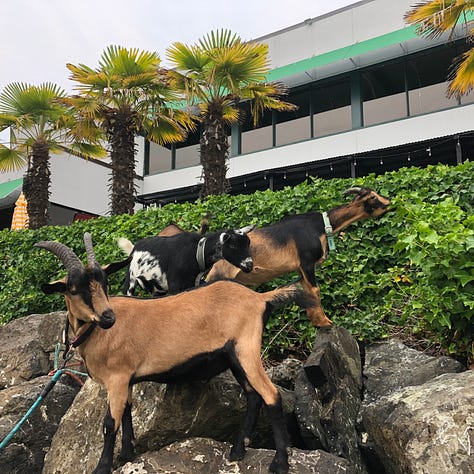
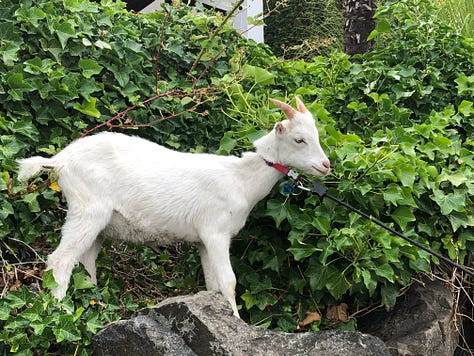
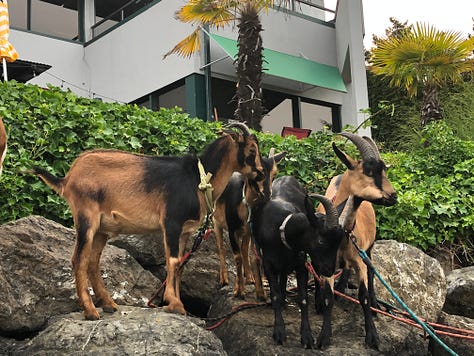
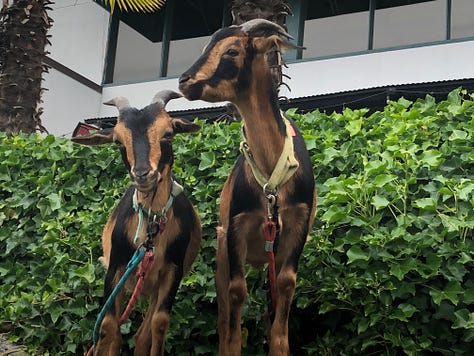
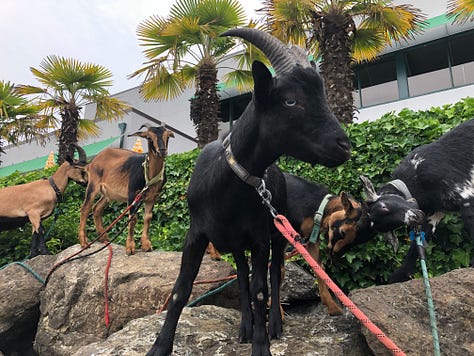
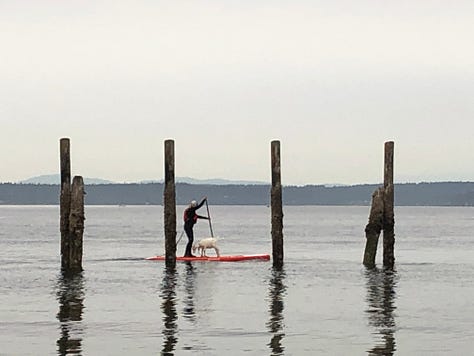
Heron monitoring begins just before the onset of spring and goes through the summer. It involves recording courtship behavior, nest-building, incubation, and the ultimate hatching of chicks, as well as keeping an eye out for predators.
The leaders of Heron Habitat Helpers are very organized. Volunteers are given several maps of the trees in the ravine where nest-building occurs, a spreadsheet updated each week with the location of each nest, and a series of codes to record what’s happening (empty nest, one or two birds sitting in nest, copulation, nest building, incubation, etc.). The most confusing part of the process is figuring out which tree and which nests are which. It takes around two hours to monitor and record them all.
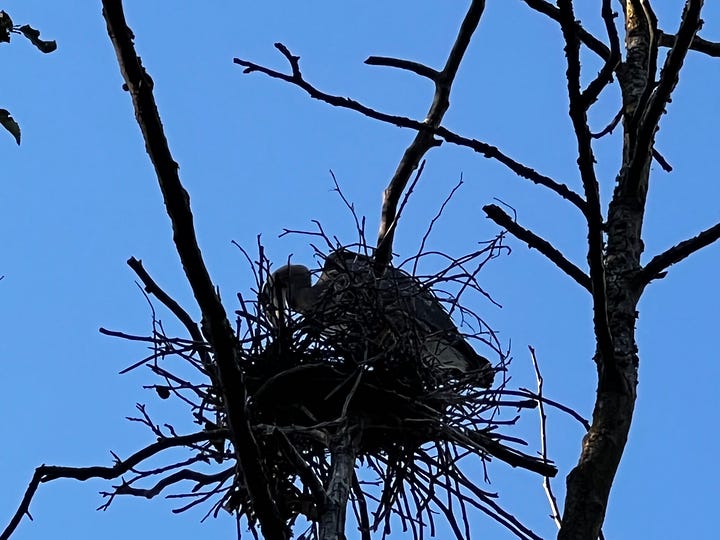
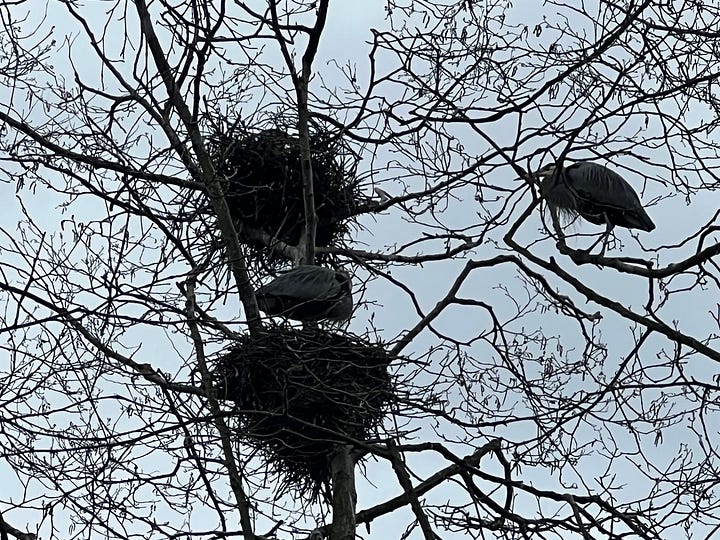
In my previous life, before illness curtailed me, I was an avid, go-getter kind of volunteer. I wrote grants to redo our elementary school playground, install a rain garden, and a reader-board festooned with tile mosaics that we had each student make. I established an annual international potluck. I ran the parent education committee at my kids’ high school. I cooked, contributing food whenever there was a gathering that called for it or a person who needed it.
Everything I’ve read about thriving during late midlife and beyond suggests that volunteering is an important source of well-being.
But no sooner had I started driving my regular delivery route for the Ballard Food Bank, then I had to give it up, because surgery made it impossible for me to lift bags of food and chemotherapy made me immunocompromised. I could also no longer check membership cards or run food at the Elks.
Most weeks I’ve been too tired to cook much, so have been grateful to be the beneficiary of a Meal Train, organized by a friend, with delicious weekly meals delivered by friends from several facets of my life.
It’s been humbling to be a receiver, rather than a giver.
For me, heron monitoring got off to a rocky start. The first challenge was the fickle spring weather, which made standing outside for nearly two hours rather unpleasant. Even Seattleites can have our fill of rain. The next time we were scheduled to monitor, I was felled by a nasty cold and had been exposed to COVID, so opted to stay home.
This week, though radiation fatigue had set in and we were having a cold snap, I dragged myself to the ravine and I’m glad I did, donning my warmest waterproof winter coat. One of our leaders said she had heard some faint chick sounds, with more expected as the weeks go on. I didn’t see or hear any chicks but the nests that had been newly under construction the last time I looked were now robust. With my binoculars, I could see incubating herons in several of them.
Luckily, I am paired with two intrepid teammates, one of whom is particularly adept at figuring out the sometimes confusing placement of the trees and the nests. Both teammates have taken on the task of recording our findings and transferring them to the Google doc that tallies each week’s observations and they are very kind and understanding that this task feels like too much for me now.
I’m not used to being a slacker and am trying to accept this as a moment of Personal Growth.
A lot of people have commented on middle aged people’s love of birds. I have seen several versions of this meme kicking around the internet.
There is indeed something mesmerizing about slowing down to listen and observe the avian world.
For me, there’s also an obvious metaphor about nurturing nests and the natural progression that enables a fledging to eventually fly free.
This week’s delicious meal was delivered by my friend K, a cancer survivor who recently hit her five-year mark. “I feel like I’m free-falling,” she admitted, after having her final visit with her oncologist.
Active cancer treatment is like being nurtured in a protective nest. There is always someone monitoring you and always someone to call if you have a concerning side effect. For me, this week it was itchy ears.
But there’s a term called survivorship, which relates to the aftermath, when treatment is over, the disease is at bay, and you are expected to get on with your life— pushed out of the nest and back into the world. It can be disconcerting, since you don’t know if and when the cancer will return and whether a symptom like itchy ears warrants concern.
I got a taste of this when I had my cold. Was the chest congestion a side-effect of immunotherapy or radiation, or a harbinger of pneumonia? No, the nurses reassured me. It’s just a cold.
They tell me that when I finish daily radiation, I might feel depressed because the pace of my cancer treatment will slow down considerably (honestly, I think I can find something else meaningful to fill the time) until it eventually ends.
After a year of constant monitoring and intervention, I imagine that I’ll feel unsteady as a fledgling, as my body gains strength and I spread my wings. Hopefully, I’ll gain inspiration from the herons.
P.S. In addition to my ongoing volunteer work with the Northwest Narrative Medicine Collaborative, which continues to host regular trainings and will be hosting a live storytelling event in Seattle in early May, I just signed up to be a judge in a salad contest!
What’s your most rewarding volunteer activity?
The Best Thing I Cooked This Week
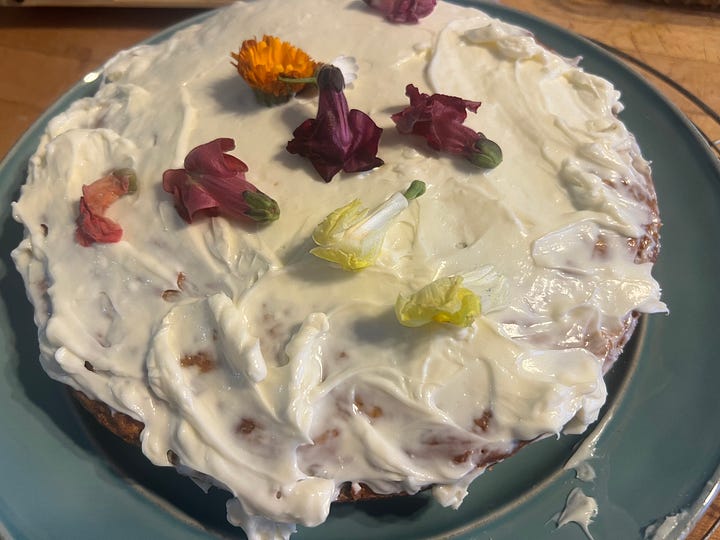
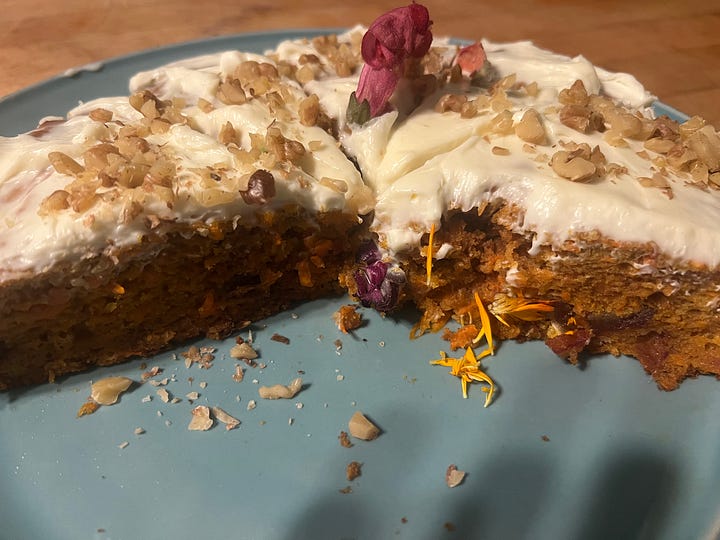
Alison Roman’s Cold Carrot Cake from Sweet Enough
On a near-perfect day, when daily radiation treatment was mercifully short, my cold was getting better, and the sun was shining, I decided to bake a carrot cake. I’ve mentioned before that I am a big fan of
(subscribe to her Substack; buy her cookbooks) because her recipes are reliably delicious and refreshingly uncomplicated.I felt so good after baking that cake that when J got home, I suggested we take a walk and deliver pieces of the cake to friends in need. Amy, whose mugs I told you about, was home nurturing a creaky neck. My friend C was recovering from knee surgery.
As good as it felt to bake and eat that cake, it felt even better to offer it to people who needed some TLC.
The next day, I received a text from C, whose pain meds were wearing off:
Today is hard. I’m just gonna keep eating cake.
Giving is so good for the body, heart, and soul.




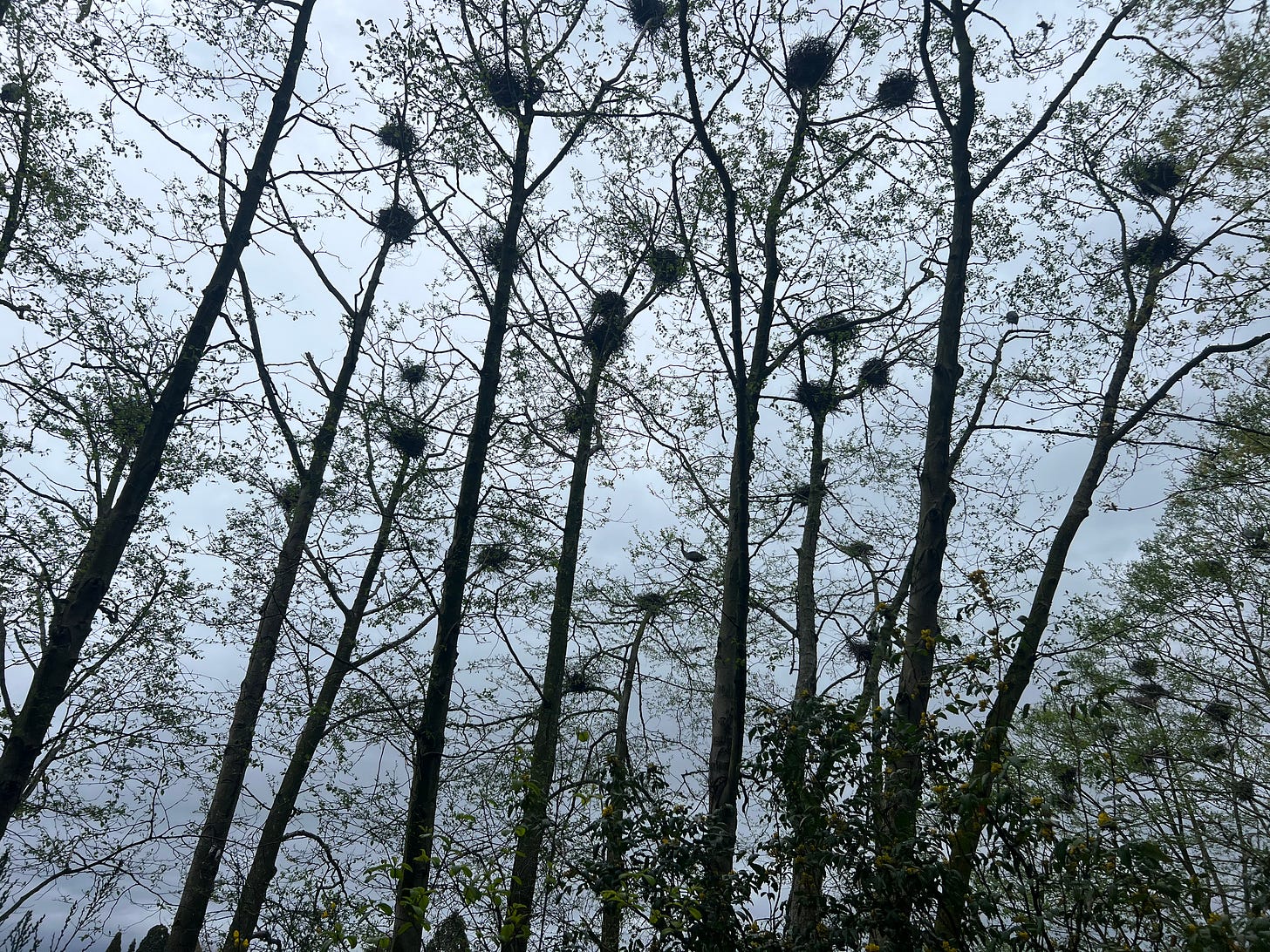
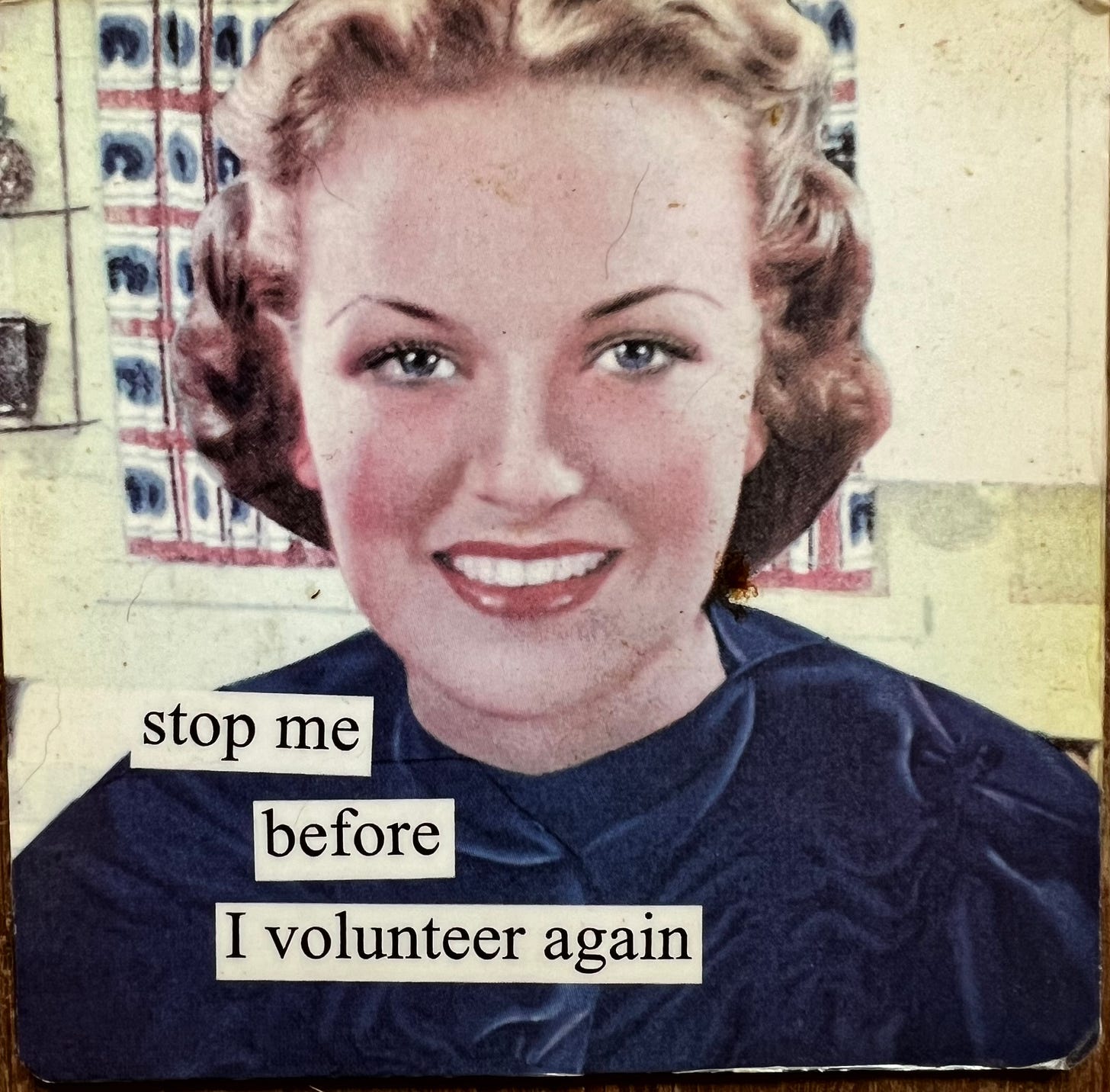
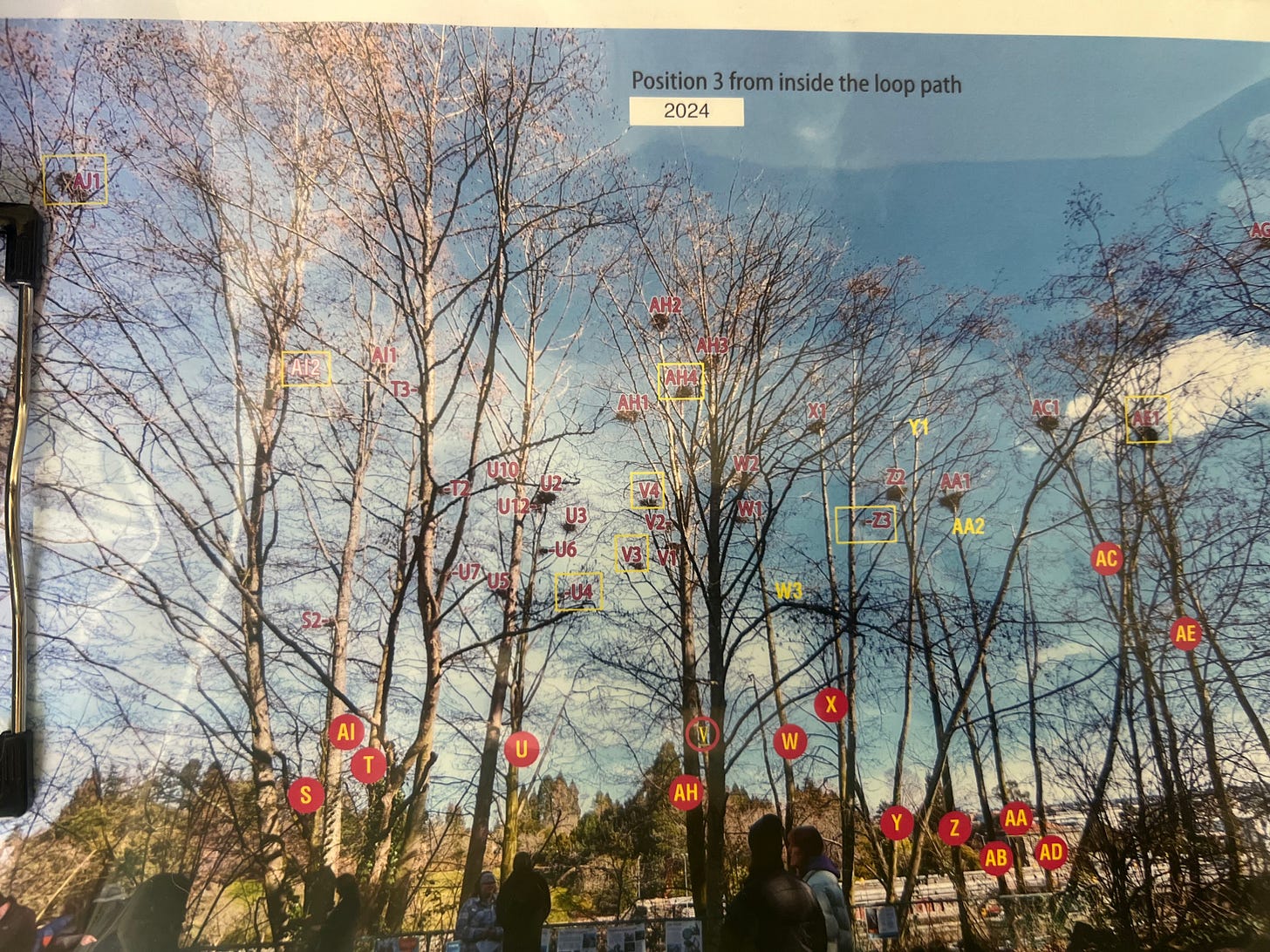
I love reading your slice of midlife Alison. I just bought the most lovely set of three vases from your friend Amy. And thanks for the shout out for narrative medicine:)
I do actively find that doing things for others makes me feel better. But it was a hard lesson to realize that if I just couldn't because of depression or other commitments or whatever, it didn't make me a bad person. That it's okay to just care for oneself and let someone else do the counting and cooking. 💖